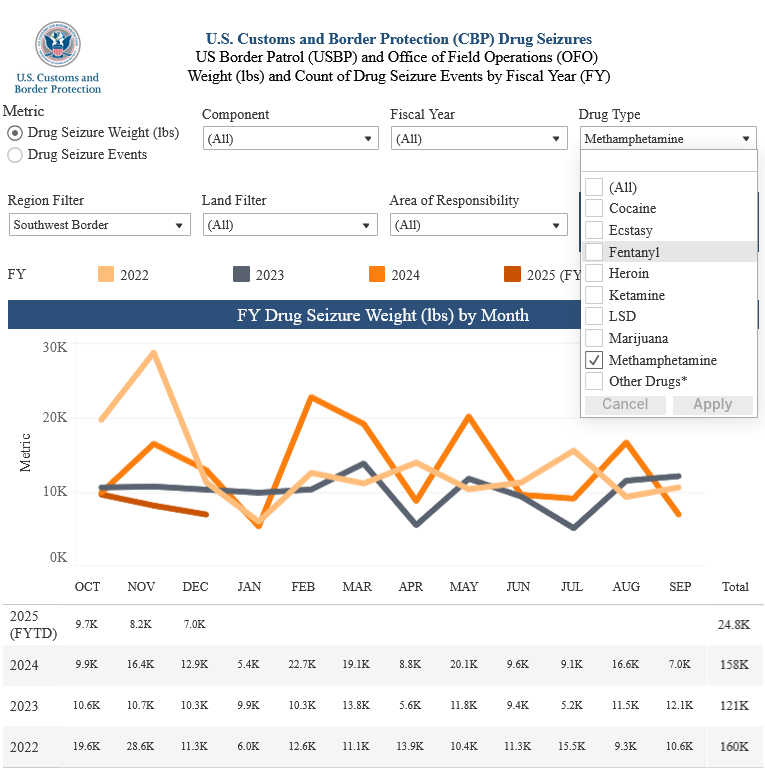
Now competing for the most embarrassing journalistic enterprise of the new year — along with the most galactically stupid one — is an offering from The New York Times.
The Times’ crack reporters have reckoned that President Donald Trump’s designating the drug cartels that control the southwest border as “terrorist” might harm the U.S. economy.
The reason:
Isolating U.S. companies from cartel activities could be almost impossible given that the criminal groups operate in sectors like agriculture and tourism, leaving some American businesses vulnerable to sanctions.
As well, as the reporters noted three times, the cartel-infested avocado trade could be in big trouble.
Maybe. But stopping the cartels, Mexico’s permission regardless, might just save some of the almost 100,000 American lives lost to fentanyl overdoses annually, not to mention those addicted to methamphetamine.
The Story
Trump designated the cartels as terrorists in an executive order on his first day in office.
Citing “former government officials and analysts,” the Times complained that the terror label
could force some American companies to forgo doing business in Mexico rather than risk U.S. sanctions … an outcome that could have a major effect on both countries given their deep economic interdependence.
The Times admitted that Trump wants to pressure Mexico to “rein in its dangerous drug trade.” But the problem is this: “Disentangling cartel operations from U.S. interests in Mexico could be immensely complicated. Mexico is the United States’ largest trade partner of goods, and many American companies have manufacturing operations there.”
Even worse, the cartels operate in legitimate businesses such as tourism and growing avocados. That would make isolating American companies from the cartels quite difficult.
And, of course, the Times’ reporters might just worry that attacking the cartels could affect their supply of avocados.
Designation Risks
In the past, the United States hasn’t designated the cartels as terrorists. “[Analysts] have looked at what the implications would be on trade, economic and financial relationships between Mexico and the United States,” said Samantha Sultoon, a fellow at the globalist, hate-Trump Atlantic Council.
She continued:
They have all come away thinking that such a designation would actually be super shortsighted and ill-considered, though prior administrations viewed the U.S.-Mexico relationship far differently than the incoming Trump administration appears to.
As well, the Times fretted, companies that pay the cartels ransom or extortion might face “substantial fines” because those payments might be seen as “material support.”
Plus,
U.S. companies could also be ensnared by standard payments made to Mexican companies that a cartel controls without the American companies’ knowledge.
To elaborate on that, the paper’s scribes hustled off to an hombre named Pablo Zárate of globalist FTI Consulting, which “released a report laying out some of the risks of the terrorist designation.” Señor Zárate, it will come as no surprise, was educated largely in Mexico.
Zárate’s background aside, those “former U.S. officials and analysts pointed out that it would be nearly impossible to identify which business[es] may employ or be affiliated with cartel members given the tens of thousands of people involved and operating in various industries, including the hotel and agriculture sectors,” the Times reported:
Cartels use the legal economy to launder money, which could mean that unwitting employees working at a resort or an avocado packing company could technically be on the cartel payroll but not know it.
As a result, companies in the risk-averse American financial sector may simply refuse to wire money to a Mexican factory, for example, to facilitate cross-border production and trade, or to wire money between personal accounts.
“Banks may turn away customers, because they may not think they are worth the risk if they have links to Mexico,” said Eric Jacobstein, a former State Department official in the Biden administration.
So again the Times fretted about avocados. Banks might no longer lend to those in the industry because it’s too high a risk. Explained Fabian Teichmann, a Swiss lawyer and expert on terrorist financing: “Banks might say, ‘We don’t want to be anywhere close to those who are considered to be terrorists, so we want to avoid that risk.’”
No avocados would be a major hardship for the Times’ foodies.
The Money Angle
Also affected could be Venmo and PayPal. The Times hastened to observe that Trump’s “close confidant Elon Musk” helped found the latter.
The terrorist label will also “push big parts of Mexico’s economy further into the shadows,” Teichmann told the Times, because that’s “where cash is used instead of electronically traceable transactions.”
“If people can’t bank legitimately, they escape to so-called underground banking systems,” Teichmann said.
Perhaps, but one reason the terrorist label might be a good idea is another fact the Times disclosed. Twelve percent of 218 companies surveyed claimed that “organized crime has taken partial control of the sales, distribution and/or pricing of their goods.”
In the United States, the authorities try to stop organized crime from establishing a foothold in legitimate business, which they use as a front to launder money and file seemingly legal tax returns.
The Times also looked at “American companies that are firmly north of the border but rely on Mexican labor. The designation is so broad and vague that ranches in Texas or farms in California could be swept up by the penalties if their employees send remittances to family members in Mexico who are involved in organized crime.”
Even worse, companies such as Western Union might stop transferring some of the $63.3 billion in remittances from Mexicans in the U.S. to families back home. That would harm Mexico’s economy because remittances make up five percent of the nation’s gross domestic product.
Mutual Defense?
Finally, the designation would open Mexico to direct U.S. military intervention. Of course, that is precisely what border czar Tom Homan promised at the Republican National Convention in July.
Craig Deare, an American diplomat in Mexico 30 years ago, said that “unilateral action would be catastrophic” because “it would dismantle any collaboration and decades of Republican and Democratic efforts to build a defense relationship with Mexico.”
“If you don’t like cooperation now, wait until Mexico cuts all ties,” he added.
As for what Mexicans think, the Times quoted President Claudia Sheinbaum, who “will always defend Mexico above all else.”
Remarkably, the Times did not contact Homan or anyone else to explain the pro-terrorist designation and why it’s imperative for U.S. national security.
Nor did the Times report that U.S. border agents seized 856,000 pounds of illegal drugs at the Southwest border from fiscal 2022 through December. Of that, 463,000 pounds were methamphetamine and 66,000 pounds were fentanyl.

“Pure Propaganda”
That’s one reason Musk offered this opinion over Robby Starbuck’s screenshot of the headline: “Pure propaganda.”
Wrote Starbuck: “I can’t believe this is a real headline. Insane.”
But as one X user noted, the Times might have another reason other than its obsession with bashing Trump for attacking his order: Carlos Slim, the Mexican billionaire.
Slim rescued it from financial disaster with a massive loan in 2009.
In 2015, the Mexican telecom tycoon became the newspaper’s largest shareholder. He sold half of those shares in 2017.




